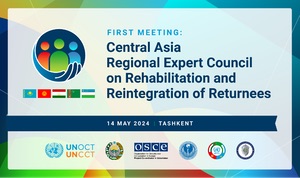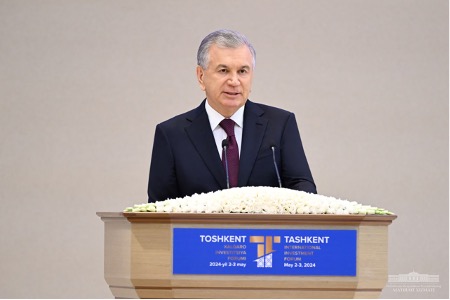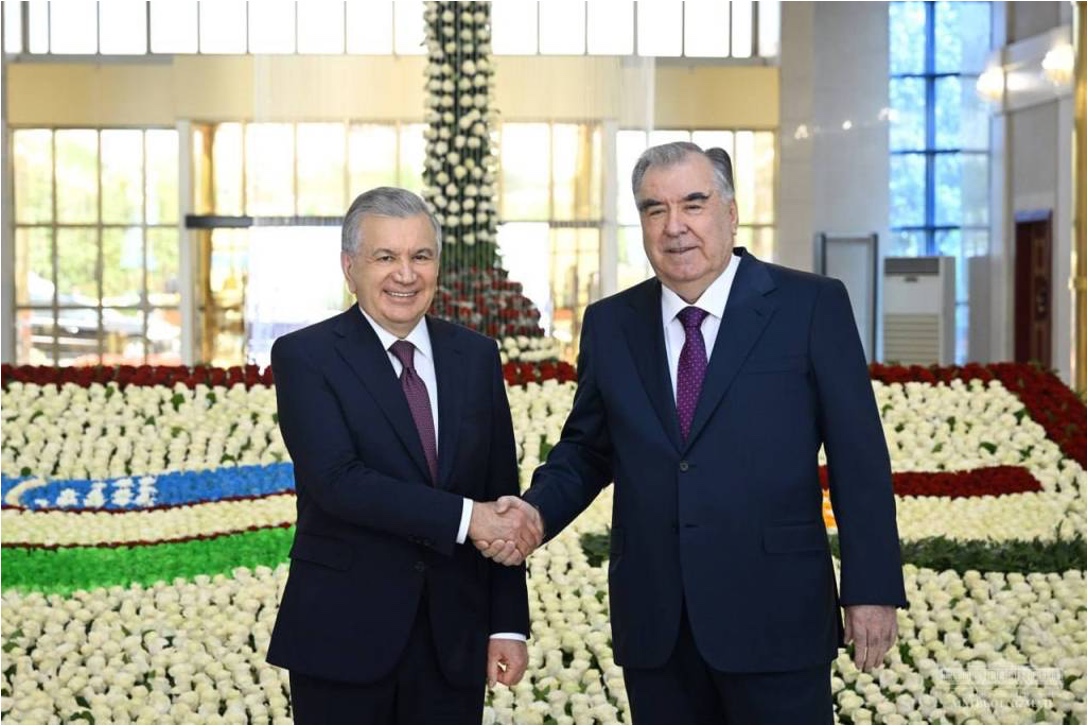
Representative of Uzbekistan elected to UN Human Rights Committee for the first time in history  On May 29, at the UN headquarters in New York, during the 40th session of the states parties to the International Covenant on Civil and Political Rights (ICCPR), elections were held for nine members of the Human Rights Committee (HRC) for the 2025-2028 term. On May 29, at the UN headquarters in New York, during the 40th session of the states parties to the International Covenant on Civil and Political Rights (ICCPR), elections were held for nine members of the Human Rights Committee (HRC) for the 2025-2028 term.
Representatives from 16 states, including Burundi, Georgia, Egypt, India, Spain, Cameroon, Côte d'Ivoire, Lithuania, Morocco, Paraguay, the Republic of Korea, North Macedonia, Togo, Uzbekistan, Croatia, Ethiopia, and South Africa, competed for the nine seats in the HRC.
READ MORE
- EGF Editor |
Published on EGF: 03.06.2024
| External Relations
-
The South Caucasus amidst shifting geopolitics  By Vasif HUSEYNOV, PhD, Head of Department, AIR Center, Adjunct Lecturer, ADA and Khazar Universities, Baku By Vasif HUSEYNOV, PhD, Head of Department, AIR Center, Adjunct Lecturer, ADA and Khazar Universities, Baku
There is a growing consensus among some analysts that Western policies towards Russia and China have been a big disaster. Instead of preventing the creation of the Sino-Russo alliance, the West has virtually pushed Russia into the arms of China. The opposite was expected from the United States by many scholars and veteran diplomats, including Henry Kissinger. The United States will have to reach an understanding with China on a new global order to ensure stability, or the world will face a dangerous period like the one which preceded World War One, he said in 2021, two years before he passed away. Against the backdrop of the latest visit of Russia’s President Vladimir Putin to China, which is reported to be the 40th meeting between the leaders of the two countries over the past 10 years, there is enough ground to argue that Washington failed to “reach an understanding with Beijing on a new global order.
READ MORE
- EGF Editor |
Published on EGF: 31.05.2024
| External Relations
-
Trans-Afghan corridor: Uzbekistan's initiative serves the development of a larger region  Yu. Imomova Yu. Imomova
Research fellow
Institute for Prospective International Studies
Under UWED
In recent years, the main principle of the foreign policy of the Republic of Uzbekistan has been the establishment of good neighborly relations, in particular, strengthening economic ties with Afghanistan, providing comprehensive assistance in preventing a humanitarian crisis in this country, implementing the Trans-Afghan railway project, cooperating on the Kosh-Tepa canal project, and other issues. Evidence supporting this perspective is the strategic focus of the Republic of Uzbekistan's development plan for 2022-2026, which emphasizes fostering comprehensive relations with Afghanistan and aiding its socio-economic revitalization.
READ MORE
- EGF Editor |
Published on EGF: 28.05.2024
| External Relations
-
What does the India-Iran Chabahar port deal mean for Armenia?  By Yeghia TASHJIAN, Beirut-based regional analyst and researcher, columnist, "The Armenian Weekly” By Yeghia TASHJIAN, Beirut-based regional analyst and researcher, columnist, "The Armenian Weekly”
On May 13, 2024, Iran and India signed a historic deal under which New Delhi was granted the right to develop and operate the Iranian port of Chabahar on the Gulf of Oman. India has been eying this port for the past two decades to export goods to Iran, Afghanistan and Central Asian countries and bypass the Chinese-developed ports of Gwadar and Karachi in Pakistan. Commenting on the deal after the signing ceremony in Tehran, India’s Shipping Minister Sarbananda Sonowal said, “Chabahar Port’s significance transcends its role as a mere conduit between India and Iran; it serves as a vital trade artery connecting India with Afghanistan and Central Asian Countries.” Under this agreement, the Indian Ports Global Limited (IPGL) company will invest $120 million in the port with an additional $250 million in financing. Within this context, Indian Foreign Minister Subrahmanyam Jaishankar told reporters in Mumbai that this deal will open the path for new, larger investments to be made in the port.
READ MORE
- EGF Editor |
Published on EGF: 23.05.2024
| External Relations
-
Armenia and Azerbaijan Step Up Work on Peace Deal  By Vasif HUSEYNOV, PhD, Head of Department, AIR Center, Adjunct Lecturer, ADA and Khazar Universities, Baku By Vasif HUSEYNOV, PhD, Head of Department, AIR Center, Adjunct Lecturer, ADA and Khazar Universities, Baku
On May 10 and 11, the foreign ministers of Armenia and Azerbaijan, Ararat Mirzoyan and Jeyhun Bayramov, respectively, met for another round of bilateral peace negotiations in Almaty, Kazakhstan. It was the second meeting this year between the two sides after meeting in Berlin on February 28 and 29. The Almaty talks came after the initiation of the delimitation process on the Armenian-Azerbaijani interstate border, with the return of four non-enclave villages to Azerbaijan in April (see EDM, April 17, 23, May 14). The act was celebrated by some as the first instance in the post-Soviet era of a peaceful resolution in the long-standing territorial disputes between the two countries (Azertag.az, April 19; State.gov, April 28). The two parties hope to build on this progress and foster a constructive atmosphere during the talks in Almaty. These developments point to progress in the peace process between Armenia and Azerbaijan, demonstrating both sides’ willingness to pursue improved relations.
READ MORE
- EGF Editor |
Published on EGF: 23.05.2024
| External Relations
-
The alternative scenarios facing the South Caucasus  By Benyamin POGHOSYAN, PhD, Chairman, Center for Political and Economic Strategic Studies By Benyamin POGHOSYAN, PhD, Chairman, Center for Political and Economic Strategic Studies
As the global order continues to morph into a more complex architecture with an array of global and regional powers, the geopolitical future of the South Caucasus hangs in the balance. The tectonic changes in the region of the last four years – the 2020 Nagorno-Karabakh war, the regional implications of the Russian invasion of Ukraine, the military takeover of Nagorno-Karabakh by Azerbaijan, and forced displacement of Armenians, the EU candidate status for Georgia and Georgia’s quest for multi-vector foreign policy including the establishment of strategic partnership with China, the limbo in Armenia–Azerbaijan negotiations, growing assertiveness of Azerbaijan and eventual move of Armenia towards closer cooperation with the EU and the US – all make the situation quite complex.
READ MORE
- EGF Editor |
Published on EGF: 14.05.2024
| External Relations
-
Border readjustment in Tavush, what’s next?  By Yeghia TASHJIAN, Beirut-based regional analyst and researcher, columnist, "The Armenian Weekly” By Yeghia TASHJIAN, Beirut-based regional analyst and researcher, columnist, "The Armenian Weekly”
On April 17, 2024, Armenia’s Prime Minister Nikol Pashinyan, at a meeting with the residents of Kirants village in the Tavush region, said that for the past 30 years, the residents have lived “in the conditions of lawlessness, and the time has come to put an end to this, to establish a rule of law” in the region. The PM added: “Our idea is for you not to say Azerbaijan is 50 meters away, but to say, wow, it is good that Azerbaijan is 50 meters away. We will trade there. We will build the economy there. Maybe we will build another checkpoint. Cars will come and go and pay the Republic of Armenia.” He later continued: “Now you can say to me: Do you 100-percent guarantee that you will do this? I will answer, I don’t guarantee 100-percent, but I know that by taking step by step, we will reach 90-percent or even more.” Azerbaijan insists that there are four bordering villages near Armenia’s Tavush and Azerbaijan’s Qazax region that must be ceded to Azerbaijan. Baku argues that these villages were taken by Armenian forces in the early 1990s.”
READ MORE
- EGF Editor |
Published on EGF: 14.05.2024
| External Relations
-
Tashkent will host the first meeting of Central Asia Regional Expert Council in Rehabilitation and Reintegration of Returnees  Tashkent/New York/Vienna, May 10, 2024. Tashkent/New York/Vienna, May 10, 2024.
On May 14 this year, the first meeting of Central Asia Regional Expert Council in Rehabilitation and Reintegration of Returnees from armed conflict zones will be held in Tashkent.
The Regional Expert Council is being established on the initiative of the President of Uzbekistan, Mr. Shavkat Mirziyoyev, put forward in March 2022 in Tashkent at the high-level conference “Regional cooperation of the countries of Central Asia under the Joint Action Plan for the implementation UN Global Counter-Terrorism Strategy” and supported by international partners.
READ MORE
- EGF Editor |
Published on EGF: 10.05.2024
| External Relations
-
Address by President of the Republic of Uzbekistan Shavkat Mirziyoyev at the Third Tashkent International Investment Forum  Dear participants of the forum! Dear participants of the forum!
Ladies and gentlemen!
At the outset, let me sincerely welcome you at the third Tashkent International Investment Forum.
I would like to note with pleasure that within the framework of this format, which is becoming a great annual tradition, new and reliable partners from all continents of the world are gathering in our country. Over the past three years, this Forum has provided a broad platform for enhancing collaboration, discussing pressing issues, and generating fruitful ideas and solutions to tackle the most urgent challenges.
READ MORE
- EGF Editor |
Published on EGF: 02.05.2024
| External Relations
-
Uzbekistan-Tajikistan: commitment to deepening cooperation based on principles of good-neighborliness and mutual trust  President Shavkat Mirziyoyev will pay a state visit to Tajikistan on April 18-19 at the invitation of President Emomali Rahmon. President Shavkat Mirziyoyev will pay a state visit to Tajikistan on April 18-19 at the invitation of President Emomali Rahmon.
As close neighbors whose peoples are historically and culturally inseparable from each other, Uzbekistan and Tajikistan have brought their relations to the level of strategic partnership and alliance.
The close and constructive political dialog established between the leaders of the two countries, supported by regular bilateral and multilateral meetings, plays a huge role in the development of mutually beneficial and fruitful cooperation.
READ MORE
- EGF Editor |
Published on EGF: 19.04.2024
| External Relations
-
|
|
